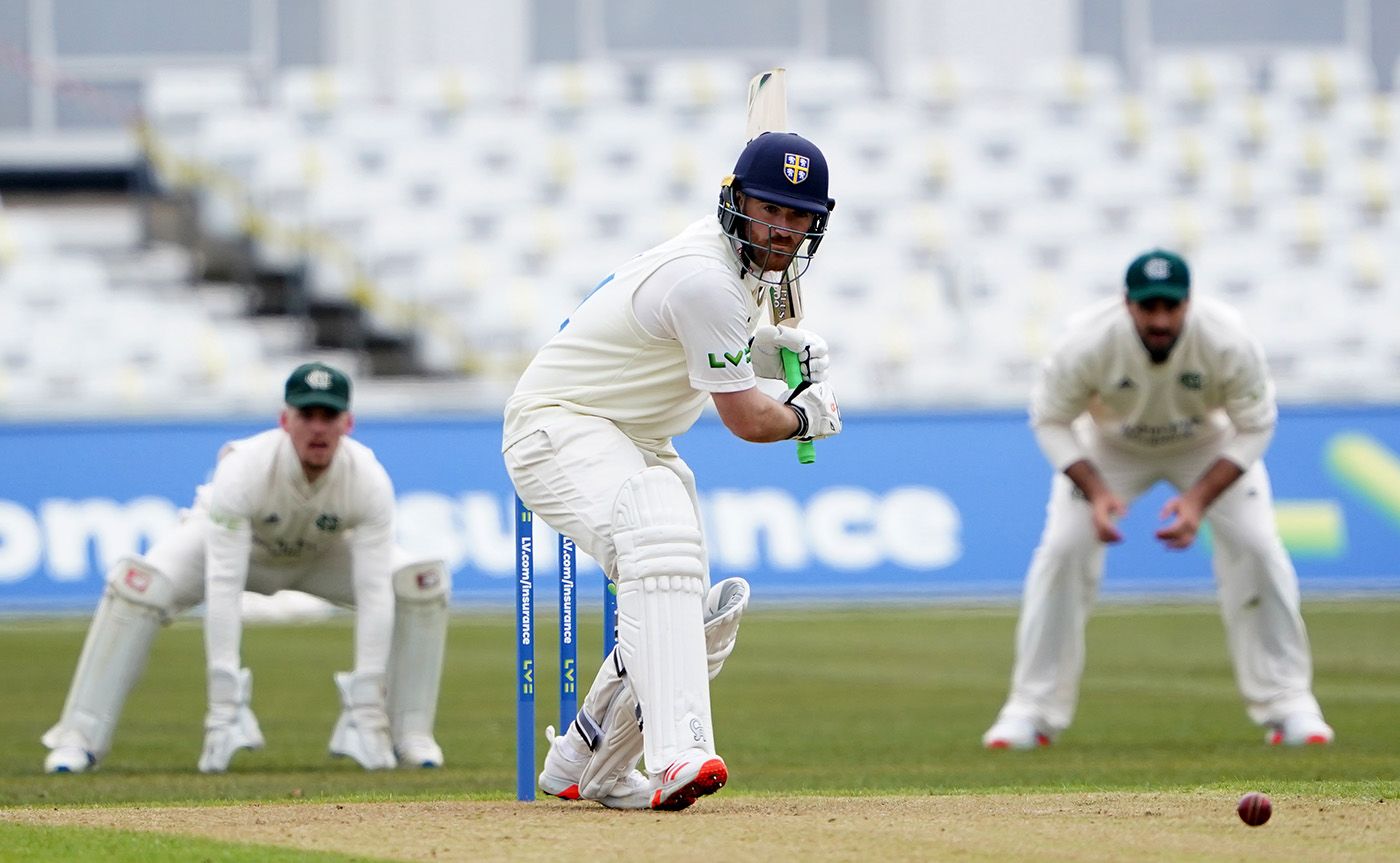Nottinghamshire slip to 85 for 6 in response to 330 before Tom Moores steadies innings
Nottinghamshire 165 for 7 (Salisbury 3-54) trail Durham 330 (Raine 59*) by 165 runs
Durham seized the initiative at a cold and damp Trent Bridge, where a familiar Nottinghamshire collapse with the bat was compounded by an injury to their England fast bowler, Jake Ball.
The 30-year-old, whose return to wicket-taking form last season earned him a place in England’s white-ball squads in India after three years out of the international picture, took two wickets on the first day here but had bowled only nine deliveries on the second morning when a back problem forced him off the field. Nottinghamshire said it was “sore” and is “being monitored”.
With Ball out of the attack, Durham built well on the fightback mounted by Brydon Carse and Ben Raine late on the first evening to post a more competitive first-innings total than had once seemed likely.
Their seam attack then took advantage of difficult batting conditions on a gloomy afternoon to reduce Nottinghamshire to 85 for 6 before Tom Moores and Liam Patterson-White stemmed the flow of wickets in a stand of 56.
Durham’s recovery with the bat had been built around Raine’s unbeaten 59 as their last three wickets added 134. His partnership with Carse – ended by Brett Hutton’s first wicket of his second spell as a Nottinghamshire player – added 54 before last man Chris Rushworth helped put on another 59.
“We have spoken a lot about getting runs down the order because those extra 40-60 runs can make a big difference, especially on a wicket that is doing a bit,” Rushworth said. “Getting from 260 to 330 is a massive difference in conditions like this, so we think we did a really good job batting.
“Speaking to a few of their lads, the wicket didn’t really change much but I think we bowled a fuller length and got more reward from it. There was less wind, too, and the conditions suited, slightly warmer and with cloud cover all day, but overall I think we bowled better.
“We are still well in front in the game and we have played some good cricket up to now but it is important we start right on the money again in the morning.”
Relegated in 2019, Nottinghamshire looked to have remedied some of their batting woes last year, clocking up more batting points than any other side in the Bob Willis Trophy, even if they still failed to conjure up a win.
Yet now they looked fragile again, albeit with the ball zipping around. Ben Slater, Ben Duckett and Steven Mullaney all fell in defensive mode, bemused by late movement that found the edge. Likewise Haseeb Hameed, who lost his off bail to Matt Salisbury‘s best delivery in a three-wicket new-ball spell. Joe Clarke, on the other hand, executed a horrible shot to the ball that followed Hameed’s demise and was caught behind off a bottom edge.
Lyndon James, the young allrounder, played nicely for his 28 but was caught off a steepling top edge as he swung lavishly at a ball from Carse, Poynter sprinting halfway down the pitch to claim his fourth catch.
Patterson-White gave good back-up to the more experienced Moores in adding 56 for the next wicket but as Poynter pouched a fifth catch and Rushworth a second wicket Nottinghamshire were still 165 behind when the bad light and drizzle that caused a brief stoppage before tea ended play early.
Nottinghamshire assistant coach Ant Botha said: “We knew that Durham bat deep and, though losing Jake Ball early didn’t help, we would have liked their total to be 50-60 short of what it was. With 330 on the board the momentum was with them and we needed to start off well. We didn’t, but to give Durham credit I thought they bowled exceptionally well and if you look at the wickets lost, barring Joe Clarke, there were some good balls out there.
“On a day like this, it is tough to bat because there are going to be some good balls, but we can sense there is fight in the team and if we can fight from here and get close to their score it is game on.”
In common with other grounds, the afternoon session began with players and match officials lining up on the outfield in front of the pavilion to observe a two-minute silence in remembrance of His Royal Highness, the Duke of Edinburgh, whose death had been announced during the morning. The flag over the pavilion was lowered to half-mast and the players took to the field wearing black armbands.
